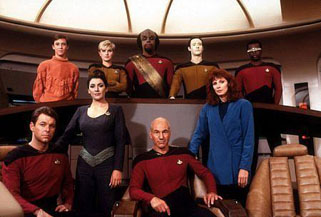|
|
Mythology: Star TrekBy Martin FelipeJune 3, 2010
Of course, like most people, I'm a bit more familiar with Star Trek: The Next Generation, which is so consumed with the ideology of the Prime Directive it eliminates much of the potential for conflict. See, here's the problem, we libs are a peace-loving sort, and that may be all well and good in the real world, but is deadly for drama. When telling stories, conflict is key, and Picard and his buddies are so intent on not interfering, it can get kind of dull. Hell, the very description of the show is to boldly go where no man/one has gone before. That's it. To look around. Sounds cool at first, but when you consider what that means, as audience members, we are watching people watch. We are voyeurs of the voyeurs. Now I know I've been a big proponent of strong characters overcoming weaknesses in the story or formula, and Star Trek is no different. If you can't create tension from without, create it from within. I do think the characters are incredibly well drawn in Trek, if of varying levels of quality acting-wise. We all know the big names, and they are rife with potential for conflict. Dashing, impulsive Kirk, crotchety old McCoy, jovial Scotty, steadfast, cerebral Picard, loyal Ryker, and so on. The characters are so well-drawn, we can derive pleasure from watching them behave exactly as we expect and predict them to. Some characters are even defined by their internal conflict, as in the case of Spock grappling with his emotions or Data's dreams of becoming a real boy. Including Worf, a Klingon, the villains of Kirk's Enterprise, as part of The Next Generation crew is a particular inspiration. Problem is, Trek is so mired in the reset button nonsense of traditional television storytelling that the dynamics rarely change, and the characters rarely evolve, so the conflicts become stagnant.
|

|
|
|

|
Friday, April 19, 2024
© 2024 Box Office Prophets, a division of One Of Us, Inc.


